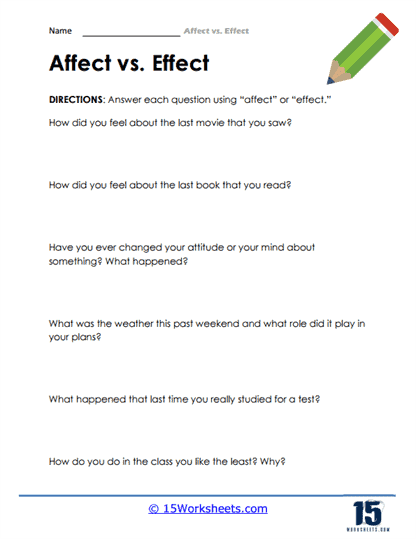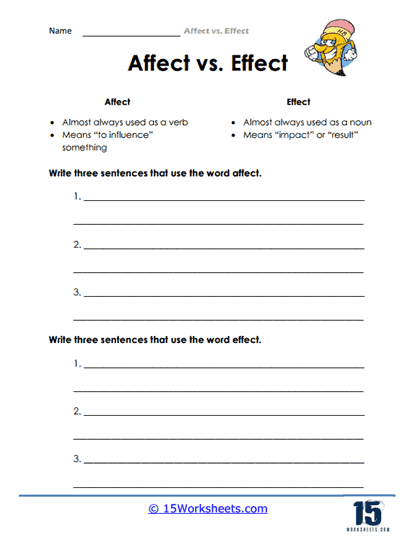Affect vs. Effect Worksheets
About Our Affect vs. Effect Worksheets
It is important to know when to use “affect” vs. “effect” because these words have different meanings and functions in a sentence, even though they may seem similar at first glance. They function as different parts of speech and that should be reflected in the manner that we use them in our language.
Affect (verb): This word primarily means to influence or produce a change in something. It is used when discussing how one thing has an impact on another. Example: The weather can significantly affect our mood.
Effect (noun): This word generally refers to the result, outcome, or consequence produced by a particular cause or action. It is used when discussing the change that has occurred or is expected to occur. Example: The new law had a positive effect on the economy.
Why is it important for students to learn the difference between Affect and Effect?
Learning the difference between affect and effect is important for students because these two words have different meanings and usage in grammar, and confusion between them can lead to misunderstandings and errors in writing and speaking.
Affect is a verb that means to produce a change or influence something, such as “The new policy will affect the company’s profits.” Affect can also refer to a person’s emotional state or behavior, as in “The bad news affected her deeply.”
On the other hand, effect is a noun that refers to a result or consequence of something, such as “The effect of the medicine was immediate.” Effect can also be used as a verb, meaning to bring about or cause something to happen, as in “The new program will effect positive changes in the community.”
The confusion between affect and effect can arise because both words have similar spellings and can be used in similar contexts. However, using the wrong word can change the meaning of a sentence and result in grammatical errors.
For example, using “effect” instead of “affect” in the sentence “The new policy will effect the company’s profits” would be incorrect, as “effect” is a noun and doesn’t fit in the sentence’s context. Similarly, using “affect” instead of “effect” in the sentence “The medicine had a profound affect on his health” would also be incorrect, as “affect” is a verb, and “effect” is the noun that fits the sentence’s meaning.
Therefore, by understanding the difference between affect and effect, students can improve their writing and communication skills and avoid common grammatical errors.
What is the Difference between Them?
The difference between certain words can baffle even those who have English as their first language. Hence, it can certainly confuse those whose first language isn’t English. One such case is of the terms “affect” and “effect”. Here’s a basic guideline to help you clarify the difference between affect vs effect.
The Term “Affect”
The verb “affect” typically means “to produce a change in or to act on.” For instance, “The medicine affected his condition.” Hence, the sentence implies that the medicine produced a change in his condition.
On the other hand, it can also mean “to move the feelings of or impress the mind.” For instance, “The ending of the movie deeply affected him.” Here, it means that the ending of the movie changed his thoughts or feelings.
Similarly, it is also possible to substitute the word “affect” with another more useful verb. For instance:
- The medicine worsened his condition
- The ending of the movie deeply moved him
The Term “Effect”
As opposed to “affect,” “effect” is used as a noun and it typically means a “consequence” or “result.” For instance, “His skin cancer was an effect of sun exposure.” You can also check if the term has been used correctly by using another noun in its place. For instance, “His skin cancer was a result of sun exposure.”
The best way to understand the difference between affect and effect is by memorizing “affect” as a verb (action) and “effect” as a noun.
Affect
Instead of causing something, the term is often use to express influence. Here are some examples:
How does one’s performance affect their success at work?
The detrimental weather conditions will affect masses who plan to attend the concert.
Again, it can also be used as a noun in certain cases, especially when it’s about referring to an emotional display. Here are some examples:
- The young woman’s speech had a humorous affect.
- She took the bad news with little affect.
Effect
Since the term “effect” is mostly used as a noun, it often points toward a thing or an event. Hence, it’s used when you discuss the end result. For example:
- Did her decision have any effect on her family?
- What effect did the change of policies have on the company?
The Use of Effect and Affect in Sentences
Here are some more example sentences for effect and affect to help you gain a clearer picture of the differences between them:
Effect
- A healthy amount of sleep has a good effect on the rest of your day
- Media can have a huge effect on the opinions of people
- A lot of special effects in most movies are produced by technology
- The new equal-pay law will go into effect in two days
- A light paint color will have the effect of making a room appear bigger
Affect
- Excessive rainfall in the region can affect the crops negatively.
- Drinking alcohol can adversely affect your liver function.
- Physical proximity with a closed one can affect your immune system positively.
- My early years in school greatly affected my self-image and self-esteem.
- Inadequate hours of studying will affect your overall grade.















